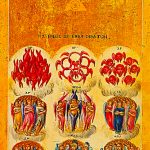I’m usually puzzled when people react to something I say as though it were inconsistent with the rest of what I say. Yes, it’s true that on some things (typically aesthetic things) I’m not always consistent. So, for instance, I like the Beatles, but not John Lennon’s solo work. I like chocolate, and steak. But not chocolate steak. I have no great sympathy for Bruce Cockburn’s politics, but I like his music. I have no sympathy at all for Gene Roddenberry’s philosophy, but I enjoy Star Trek. Do I contradict myself? Very well, I contradict myself. I am large. I contain multitudes.
But in terms of my general social philosophy and outlook on the world, I don’t see what’s so mysterious and complex about it. It’s this: I try to conform to the Church’s teaching on stuff. That’s really it. When the Church condemns consequentialism, I conclude it’s bad. When it says abortion and torture are both evil, I urge that we avoid both. This is the impenetrable secret to much of what I have posted here for the past five years concerning the American political scene.
However, there is something else as well, and it seems to provide yet another layer of mystery for many readers. Namely, the Church’s notion of the hierarchy of truth and of the relationship between good and evil.
The Church does not see evil as the “opposite” of good precisely. That’s because we are not Manichaeans. We do not believe that evil is a power equal and opposed to good. Rather, we believe that evil is a parasite on the good, a perversion and (mark this) a thing that must always depend on the good in some way for its very existence, while the good exists without needing evil. Because of this, we can always say of any evil that there is *something* of the good about it. Even Satan still retains the good gifts of existence, power, and intellect that his Maker gave him (perverted though they are). To deny this is to deny that God is the absolute Creator of All.
The Church affirms this principle in many ways. So, for example, you find the Church affirming what can be affirmed in paganism (Acts 17). You find her making use of pagan images and concepts in order to fill them with Christian content (Christmas trees, easter eggs, etc.) You find St. Thomas carefully poring over the work of both a pagan (Aristotle) and a Muslim (Averroes) in order to glean from their good work what is useful and true and place it in the Christian tradition.
At the same time, you also find in the Church’s tradition moments where she does not affirm what she has in common with other religious or philosophical traditions but instead says “Why settle for the half-empty glass instead of the full one? Why waste time listening to teachers who are robbing from the Church’s tradition in order to make war against her?” The Reformation is such a period. There, you have a great many teachers grabbing bits of the Tradition, saying a great deal of nonsensical (not to mention evil) stuff and offering it as the gospel and the Church basically battens down the hatches and says, “Don’t waste your time trying to find diamonds in dung heap of violently anti-Catholic polemics. Stick with the fullness of the gospel.”
Both the glass half full and glass half empty approaches are, by the way, in the gospel. Jesus warns, “He who is not with us is against us” and also says “He who is not against us is for us.”
So how do you navigate these two different approaches to teaching that shares commonality with our Tradition, yet which often diverges from it in big and little ways? I can only speak for myself, but my tendency is to affirm what can be affirmed when there is no danger that somebody will swallow the semi-Catholic teaching whole and to distinguish (sometimes very sharply) between the semi-Catholic teaching and the Church’s tradition when the false teacher actually seems to be taken as a substitute Magisterium by tribal zealots.
I mention this because various folks are complaining that I linked to something on Rod Dreher’s blog re: Glenn Beck, which of course can only mean that I agree with everything that Rod Dreher thinks, as well with everything everybody (especially every non-tribal member) Dreher has ever linked thinks. Similarly, any faintest hint that Obama is not the sum total of evil in the universe is raising dark suspicions in the minds of many readers. And finally, my dismissal of Glenn Beck as a crank is being greeted with pleas to drop everything and start poring over his Da Vinci Code musings on art in order to get to the Hidden History of our Time. One reader (notable for her obsessive loathing of Dreher) sums up the mystery by asking, “Silly question: How come we’re not supposed to heed Beck because he left the Church, yet we are supposed to heed Dreher, who also left the Church?”
What can explain the inconsistencies of my position?
I would suggest that the explanation is “What inconsistencies?” The notion that linking something on a blog somehow constitutes a blessing on the rejection of the Catholic communion is one of the deathless and daft notions that seems to govern the blogosphers. As though there is such a thing as cyber-cooties. So I quoted a commenter on Rod Dreher’s blog. So what? The fact remains that I have critiqued his arguments for leaving the Church and haven’t retracted a word. I have further critiqued his periodic expressions of fear about the highly exaggerated dangers of Mottramism in a piece title, rather pointedly, “Docility“. And we have periodically crossed swords over his (I think) wildly exaggerated notions of Awesome Papal Power to deal with the Scandal. In short, I don’t get where my reader thinks we are supposed to “heed” Dreher. When he links something of interest I link him. When he shares his ideas about Crunchy Con stuff, I give him a polite hearing as I would a friend who was interested in model trains, but I don’t spend too much time parsing it because I share Tom Kreitzberg’s sense that it’s not really a coherent philosophy so much as an aesthetic. So I say “de gustibus” and move on.
With Obama, things are a bit different. I regard the man, not as a Mastermind of Evil, but (mostly) as an amateur who strikes me as intelligent, genuinely thoughtful, a wily Chicago pol and startlingly naive, with an almost childlike faith in the power of government to Fix it All and an even more childlike faith that people will just love him and want to do what he says. The striking thing is that saying that aloud on a blog like this is sort of like bursting into the “Hail Mary” at a Baptist church service, because anything less or other than full-throated loathing and condemnation of every single thing Obama says and does can only mean, to the increasingly tribal Right, that you are “secretly” an Obama supporter, a lefty, etc.
So, for instance, last week the wingnut end of the Dem spectrum (including, in this case, former Pres. Carter) was trotting out the tried and true smear that anybody who opposes Obama is doing so because of racism. I favorably linked the succinct remark that “Racist” is Democrat for “unclean”–a remark that is a nice summation of a common behavior seen on the Left (along with the other fave epithets “sexist”, “anti-choice” and “homophobic”. Much bustle on the Right as people denounced this cheap shot. When O when will some Democrat denounce this sort of ugly smear and acknowledge that people on the Right have a legitimate grievance?
Well, as it happens, somebody on the Left did. His name is Barack Hussein Obama. I thought that was classy, especially after having been denounced as a racist himself.
But (and here’s the thing) much of “conservatism” is now so ideologically charged that you can’t say that without getting mau-maued as a heretic. Think about that. As a Catholic, I can’t make a rather mild observation that a man did a decent thing without immediately being suspect, any more than, as an Evangelical I could say, “maybe the Catholics aren’t completely wrong about Mary” without being denounced as a danger and an enemy. Because in our tribalized political culture, it is becoming almost impossible to take seriously the Catholic teaching that nothing is pure evil and that one can always find something good, even in those with whom you deeply disagree. Any crack in the armor can only mean you are an apostate and an enemy.
Well, having grown a thick skin from years of denunciation for this and that, I no longer much care about such tribal shibboleths, so when I note that, for instance, Beck was doing some severe editing and even more severe logical leaping in order to scare his audience with the spectre of the Imperfect Constitution Goblin and the Living Constitution poltergeist, I don’t much care if I’m not asked to sit at the Cool Kids Table. I made an extremely limited point: that the Dems are right to say that a text does not exist apart from an interpretive community. We say the same ourselves when it comes to Scripture. So merely saying the Constitution is a “living document” is not a shibboleth that automatically renders the user a Monster and an Enemy, unless we stupidly want to embrace sola scriptura in our zeal to drink from the well of right wing agit prop. Acknowledging this limited point does not mean that Lefties who suddenly find rights to abortion and gay marriage in the Constitution are right, any more than it is to say that Arians who find rejection of the deity of Jesus in the Scripture are right. But you don’t defeat Arianism by become a sola scriptura Protestant and you don’t defeat leftist subversion of the Constitution by becoming a sola Constitutiona zealot.
Which, finally, bring me to Beck. Just as I do not look to Dreher or Obama as a guide for a rightly ordered social order, so I do not look to Beck. None of my readers are inclined to take either Dreher or Obama as gurus who purport to usher them into the hidden history of our time. Beck does, and lots of people are defending him with the “I learned so *much*” enthusiasm of the Dan Brown fan. If my readers were the sort of goofballs who see in Obama the Messianic Savior of the coming age I would ridicule that with zest.
Indeed, gosh! How about that? I have ridiculed it with zest! Whaddaya know? No doubt I have done so merely to cover up the fact that I totally support and adore him.
But, in fact, the vast majority of my readers are not taking Obama seriously. They are in no danger of saying (as I am constantly exhorted concerning Glenn Beck), “You know, he’s got *some* good things to say. He’s not totally evil and crazy, you know. We need to parse his words and deeds and look for what is good there!” No, judging from my comboxes, it would appear that, as Catholics, it is our duty to see no redeeming qualities in the Obama, to regard his every word as a lie and to react to any remark he may make, no matter how pedestrian and obvious, as grist for complete and utter rejection and refutation. Did he say something conciliatory in response to Carter’s charge of racism? Well then, he must be playing good cop/bad cap and trying to deceive us. But, conversely, if Glenn Beck breaks out his Dan Brown Decoder Ring and blathers about the Vast Conspiracy it is our sacred duty to pore over his crazy rubbish and find the diamonds in the dung. Tribal duty demands it.
Me: I think I have the duty to extend roughly the same amount of charity to all these guys. Taking the hierarchy of truth seriously, I can see sundry ways in which all three comport with Catholic teaching. Dreher’s Orthodoxy is, after all, very close to Catholic teaching. It even has valid sacraments. The Left’s sense that there is something crazy and wrong about a civilization that can’t provide a basic necessity like health care to people who need it is a deeply Catholic sentiment. And Glenn Beck’s distrust of oligarchy and the concentration of power in the hands of a few rich people is likewise profoundly Catholic. I can affirm all that. But I see no obligation to take Dreher’s reasons for abandoning the Catholic communion for Orthodoxy as sound, just as I see no obligation to buy Obama’s naive leftism as sound, nor Glenn Beck’s Dan Brownified Conspiracy theories as sound.
If Rod Dreher had an hour long show on Fox and multiple hours on the radio and set himself up as a teacher who was delivering to the masses the Hidden History of our Time and giving out marching orders to people who had anointed him as their guru, you can bet I’d sound the alarm, just as I have repeated sounded my alarm over the secular messianic hopes place in Obama. But he’s just a guy with a blog who sometimes links something of interest.
Glenn Beck is taken seriously by millions as a a teacher and an explainer of How the World Works. Like all heretical thinkers, he is a comment on the mainstream, just as Catholic heretics are always a comment on something wrong in the Church. The Albigensians looked good because they lived the ascetic life the Church’s shepherds should have been living. The Pope famously said to St. Dominic, “Peter can no longer say, “Silver and gold I do not have”, to which Dominic replied, “Neither can he say, ‘Rise and walk'”. So the Albigensians moved in to fill the void.
Similarly, our ruling classes (including the manufacturers of culture in the media) are not doing their job, which is why a nutjob like Van Jones can get appointed to a “Green Czar” position while the MSM is asleep at the switch. And so a Glenn Beck can bag some easy stories, just as Albigensian teachers could easily point to fat corrupt bishops. But that does not make the false teacher a reliable one. There’s a difference between nailing corruption and incompetence and having a sound social teaching to put in their place. Any Bolshevik could point to corruption and tyranny in Tsarist Russia. It does not follow that his own theory was an improvement. Beck did a service taking down Jones. It does not follow that he is a stable Leading Thinker.















